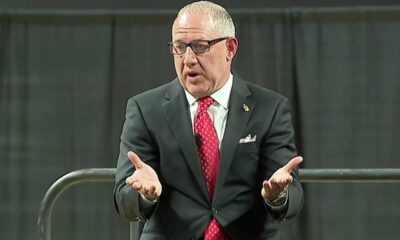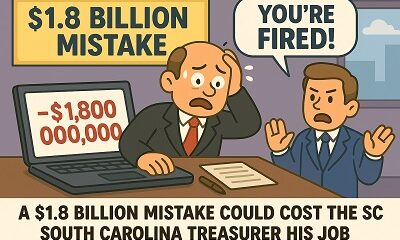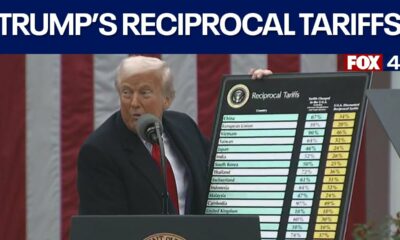News from the South - Missouri News Feed
Bill would increase Missouri secretary of state’s role in initiative petition process
by Natanya Friedheim, Missouri Independent
April 2, 2025
In the spring of 2023, efforts were underway to put the question of restoring abortion access to Missouri voters. Abortion-rights supporters geared up to collect the roughly 171,000 signatures required to put a constitutional amendment on the ballot.
Per the state’s initiative petition process, then-Secretary of State Jay Ashcroft wrote a summary of their proposed constitutional amendment. A staunch abortion opponent then running for governor, Ashcroft drafted the first part of his summary of the petition to say: “Do you want to amend the Missouri Constitution to: allow for dangerous, unregulated, and unrestricted abortions, from conception to live birth.”
It was not what the drafters had in mind. They took him to court — and won.
A judge nixed Ashcroft’s summary and wrote a new one.
A Republican-sponsored bill that has cleared the state Senate and received a House committee hearing Tuesday would make it more difficult for judges to rewrite a secretary of state’s ballot summary.
“To me this is a gross overstepping of the judiciary branch,” state Sen. Rick Brattin, a Harrisonville and the bill sponsor, said at Tuesday’s hearing.
In Brattin’s opinion, shared by opponents to abortion rights, the courts wrote a summary slanted in favor of the initiative petition that would become Amendment 3, ultimately passed by voters last November.
Senate Bill 22 allows a group to appeal the secretary of state’s summary. The court can make recommendations, but the secretary of state must revise the language within seven days
If the court finds that summary unfair, the secretary gets five days to write another draft. This process can happen one last time, and upon third revision the secretary gets just three days. Only then, if the court still finds the summary unfair, can a judge rewrite it. The back-and-forth process must take place on a set timeline prior to the general election.
Brattin’s original bill eliminated the court’s ability to rewrite a ballot summary, he said at the committee hearing, but he worked with Senate Democrats to amend it.
“This was (a) compromise,” Brattin said.
For opponents of the bill, the timeline would make it nearly impossible to oppose the secretary of state’s ballot language. The process would need to play out more than 70 days before the election.
“If the time runs out, the challenge is extinguished, and it seems to me like whatever the last language is would stand, even if the court still thinks it’s not fair,” said state Rep. Eric Woods, a Kansas City Democrat.
Sam Lee, a veteran anti-abortion lobbyist, argued courts can expedite cases related to an election. He spoke on behalf of Campaign Life Missouri and testified in support of the measure along with a representative from Missouri Right to Life.
Groups including the League of Women Voters of Missouri, the American Civil Liberties Union of Missouri, the Missouri Voter Protection Coalition, Missouri Jobs with Justice Voter Action and the Missouri AFL-CIO testified in opposition to the measure. Many voters echoed Woods’ concerns about the feasibility of the proposed timeline.
“What if today our Secretary of State was a Democrat?” asked Ron Berry, a lobbyist for Missouri Jobs with Justice and a former staffer for Democratic Secretary of State Robin Carnahan. “Would we be here today discussing this bill?”
This story originally appeared in the Columbia Missourian. It can be republished in print or online.
Missouri Independent is part of States Newsroom, a nonprofit news network supported by grants and a coalition of donors as a 501c(3) public charity. Missouri Independent maintains editorial independence. Contact Editor Jason Hancock for questions: info@missouriindependent.com.
The post Bill would increase Missouri secretary of state’s role in initiative petition process appeared first on missouriindependent.com
News from the South - Missouri News Feed
Preparing for hail damage as severe storms pass through St. Charles County
SUMMARY: Severe storms swept through St. Charles County, prompting concerns about hail damage. Justina Cornell reported live from Travers GMT Auto in O’Fallon, Missouri, where baseball-sized hail destroyed around 300 vehicles a year ago. This time, the dealership was spared, and the owner expressed gratitude. At around 3:15 p.m., skies quickly darkened, triggering automatic lights. Though conditions have since eased to overcast skies, areas like Possi may have suffered more severe damage. Eureka Fire officials deployed a crew, including off-duty responders, to assess the situation. Updates will be shared as information becomes available via KDKA.com and broadcast channels.

Severe storms passed through the St. Louis region on Wednesday. 5 On Your Side’s Justina Coronel has the latest from St. Charles County.
News from the South - Missouri News Feed
Trump to impose 10% base tariff on international imports, higher levies on some nations
by Ashley Murray, Missouri Independent
April 2, 2025
This story was updated at 6:55 p.m. EDT.
WASHINGTON — President Donald Trump rolled out sweeping “reciprocal” tariffs Wednesday on trading partners and allies across the globe.
Declaring that foreign trade practices have created a “national emergency,” the president unveiled a baseline 10% levy on all international imports, plus what he described as additional “kind” and “discounted” tariff rates that will increase but not match the rates other countries apply to American imports.
The levies will hit U.S. industries from agriculture to manufacturing to fashion.
The 10% universal tariffs become effective April 5, with higher levies set for April 9, according to Trump’s executive order. Trump’s remarks Wednesday about the start dates varied from the order’s language.
Trump is the first president to enact tariffs under the International Emergency Economic Powers Act — something he already did in March when slapping levies on China, Canada and Mexico over the production and smuggling of illicit fentanyl.
According to a table distributed at Trump’s speech, U.S. tariffs will reach 34% on imports from China, 46% on products from Vietnam and 20% on European Union imports, among other increases.
Canada and Mexico will not see additional tariffs on top of the already imposed 25% on goods (10% on energy and potash) not compliant with the United States-Mexico-Canada Agreement, or USMCA. All compliant goods can continue to enter the U.S. levy-free.
The new 34% duties on China are set to stack on top of older 20% tariffs, according to some media reports, though Trump did not specify in his remarks or order.
Countries that levy a 10% tax on American goods — including Brazil and the United Kingdom — will only see a 10% match.
The increased levies come as 25% tariffs on foreign cars kick in at midnight.
Business owners who purchase goods from outside the U.S. will have to pay the increased duty rates to bring the products over the border, unless Trump carves out exceptions for certain industries.
The president did not mention carve-outs in his remarks, but language in his subsequent executive order details exceptions for steel, aluminum, cars and auto parts already subject to tariffs under Section 232 of the Trade Expansion Act. Any products designated in the future under Section 232 will also be exempt from the new levies announced Wednesday.
Other goods not subject to the “reciprocal” tariffs include copper, pharmaceuticals, semiconductors, lumber, and “energy and other certain minerals that are not available in the United States,” according to the order.
Trump introduced the taxes on imports with fanfare Wednesday in the White House Rose Garden, where he said, “This is Liberation Day.”
“April 2, 2025, will forever be remembered as the day American industry was reborn,” Trump said.
“For decades, our country has been looted, pillaged, raped and plundered by nations near and far, both friend and foe alike,” Trump said.
Republican lawmakers, including House Speaker Mike Johnson of Louisiana and Georgia U.S. Rep. Marjorie Taylor Greene, attended the event alongside several of Trump’s Cabinet members and representatives from the United Auto Workers.
Not all Republicans have signaled support for tariffs. Senate Majority Leader John Thune said at an event in his home state of South Dakota in August 2024 that Trump’s trade policy is a “recipe for increased inflation.”
The White House has circulated figures claiming the U.S. will raise up to $600 billion in revenue per year as a result of the tariffs. The figure was met with skepticism by economists because the amount of imports will likely change under higher levies.
The U.S. is the largest importer of goods in the world, according to the Office of the U.S. Trade Representative. The country’s top suppliers in 2022 included China, Mexico, Canada, Japan and Germany.
Economists: Americans will pay
Since Trump began campaigning on tariffs, economists have warned that increased costs for businesses will be passed onto consumers.
Rising prices under Trump’s “reciprocal” tariff scenario are likely to cost an extra $2,400 to $3,400 per family, according to the Yale Budget Lab, with most of the financial burden falling on the lowest-income households.
An analysis from the Peterson Institute on International Economics estimated the typical American household would lose over $1,200, just from the 25% tariffs already imposed on China, Canada and Mexico.
Several small business owners told States Newsroom Tuesday they’re worried about increasing production costs and whether higher prices will chase away customer demand.
Erica York, of the center-right Tax Foundation that advocates for lower taxes, said in an interview with States Newsroom Tuesday that the levies will be “the largest peacetime tax increase we’ve seen in history.”
State officials worry over impact
Democratic state officials sounded the alarm Wednesday over losses for key industries that drive their local economies.
New Mexico State Treasurer Laura Montoya said her state’s energy and agriculture sectors would be victims in a trade war.
“New Mexico is a key player in this conversation, because the non-negotiable reality is that New Mexico is, like the United States as a whole, dependent on trade with our international partners particularly Mexico,” Montoya said on a virtual press briefing hosted by the state economic advocacy group Americans for Responsible Growth.
Montoya said oil and gas production accounts for 35% of the state’s budget and that the industry relies on machinery imported from Mexico.
Additionally, New Mexico, a largely rural state, relies heavily on agricultural trade. It processes a third of the cattle coming across the southwest border, and Montoya said farmers and ranchers will “face blows as tariffs on cattle and produce will result in slow food production.”
Washington state, a top U.S. agricultural exporter, sources 90% of its fertilizer from Canada.
Treasurer Mike Pellicciotti said the state would be “completely squeezed” by “reckless economic decisions.”
“He is crushing the free exchange of goods, and making it much more difficult and much more burdensome on working families. So of course, he needs to call it ‘Liberation Day,’ because he knows he’s doing the complete opposite, and he is trying to frame it in a way that is completely the opposite of what is being accomplished today,” Pellicciotti said.
Dems predict consumer stress
Democrats on Capitol Hill seized on Trump’s new trade policy as a way to push their message that the president is abandoning middle and working class households.
Sen. Angela Alsobrooks of Maryland said the White House is “tone-deaf” in dubbing the tariff announcement as “Liberation Day.”
Trump has said in media interviews, “‘You know, there’s going to be a little pain, some minor pain and disruption.’ But the people that I represent don’t regard increasing costs of groceries, increasing costs of owning a home, increasing costs of owning an automobile, as a minor disruption,” Alsobrooks said.
In back-to-back Democratic press conferences Wednesday, Sen. Tim Kaine of Virginia slammed Trump’s use of emergency powers in March to justify a 10% duty on Canadian energy and 25% on all other imports.
Kaine warned about the effect on his state’s sizable shipbuilding industry. Approximately 35% of steel and aluminum used to build U.S. ships and submarines comes from Canada, he said.
Senators approved, 51-48, a joint resolution Wednesday evening on a bill, sponsored by Kaine, that would undo Trump’s tariffs on Canadian imports triggered by an emergency declaration targeting illicit fentanyl coming over the northern border.
Four Republicans joined the Democrats in passing the largely symbolic legislation, which will now head to the House. The GOP senators included: Susan Collins of Maine, Mitch McConnell and Rand Paul of Kentucky, and Lisa Murkowski of Alaska.
Earlier Wednesday, Kaine pointed to a report in Canadian news outlet The Globe and Mail that found the White House grossly overstated the amount of fentanyl smuggled through the northern border.
“Canada stood with us on 9/11, Canada has stood side-by-side with U.S. troops in every war we have been in. They have fought with our troops. They’ve bled with our troops. They’ve died with our troops in every war since the war of 1812, and yet we’re going to treat them like an enemy,” Kaine said.
Kaine’s bill, co-signed by eight Democratic and independent senators, drew one Republican co-sponsor, Paul of Kentucky.
The bill gained statements of support from the U.S. Chamber of Commerce and former Vice President Mike Pence’s advocacy group Advancing American Freedom, among numerous organizations across the political spectrum.
House Minority Leader Hakeem Jeffries criticized Trump’s anticipated tariff announcement Wednesday morning at his weekly press conference.
“We were told that grocery costs were going to go down on day one of the Trump presidency. Costs aren’t going down in America. They’re going up, and the Trump tariffs are going to make things more costly,” Jeffries, of New York, said.
Last updated 7:31 p.m., Apr. 2, 2025
Missouri Independent is part of States Newsroom, a nonprofit news network supported by grants and a coalition of donors as a 501c(3) public charity. Missouri Independent maintains editorial independence. Contact Editor Jason Hancock for questions: info@missouriindependent.com.
The post Trump to impose 10% base tariff on international imports, higher levies on some nations appeared first on missouriindependent.com
News from the South - Missouri News Feed
LIVE: Trump announces sweeping ‘reciprocal’ tariffs
SUMMARY: On April 2, 2025, President Trump announced sweeping “reciprocal” tariffs intended to promote U.S. manufacturing and punish unfair trade practices. Dubbed “Liberation Day,” the tariffs target allies and adversaries alike, affecting autos, steel, aluminum, pharmaceuticals, and more. While the White House projects $600 billion in annual revenue, economists warn of rising costs, recession risks, and global trade tensions. Critics argue the tariffs are a massive, unilateral tax hike on American families. Allies like the EU and Canada are preparing retaliatory measures. The lack of clarity has fueled uncertainty among businesses and investors, despite continued White House confidence in the strategy.
The post LIVE: Trump announces sweeping 'reciprocal' tariffs appeared first on fox2now.com
-

 Mississippi Today1 day ago
Mississippi Today1 day agoPharmacy benefit manager reform likely dead
-

 News from the South - Alabama News Feed6 days ago
News from the South - Alabama News Feed6 days agoSevere storms will impact Alabama this weekend. Damaging winds, hail, and a tornado threat are al…
-

 News from the South - Alabama News Feed5 days ago
News from the South - Alabama News Feed5 days agoUniversity of Alabama student detained by ICE moved to Louisiana
-

 News from the South - Oklahoma News Feed4 days ago
News from the South - Oklahoma News Feed4 days agoTornado watch, severe thunderstorm warnings issued for Oklahoma
-

 News from the South - Virginia News Feed5 days ago
News from the South - Virginia News Feed5 days agoYoungkin removes Ellis, appoints Cuccinelli to UVa board | Virginia
-

 News from the South - Florida News Feed7 days ago
News from the South - Florida News Feed7 days agoPeanut farmer wants Florida water agency to swap forest land
-

 News from the South - Kentucky News Feed6 days ago
News from the South - Kentucky News Feed6 days agoA little early morning putting at the PGA Tour Superstore
-

 News from the South - West Virginia News Feed5 days ago
News from the South - West Virginia News Feed5 days agoHometown Hero | Restaurant owner serves up hope









































